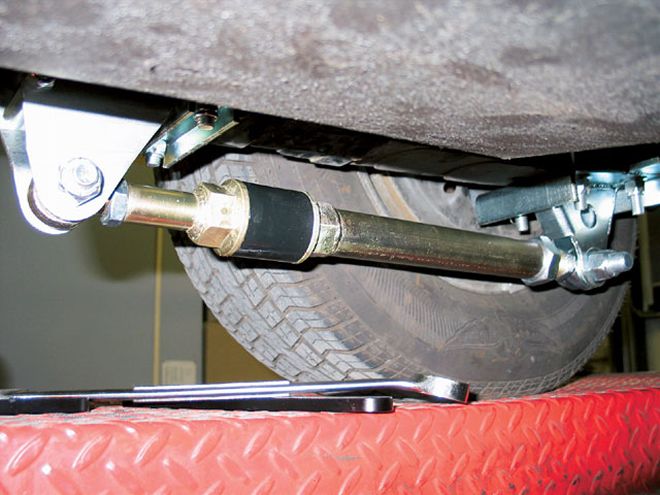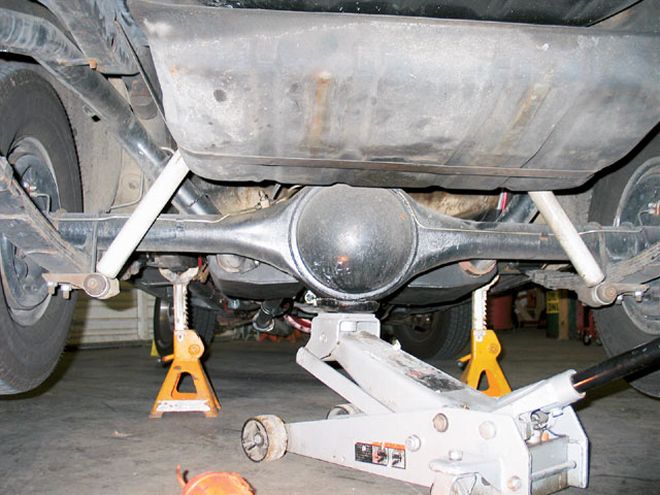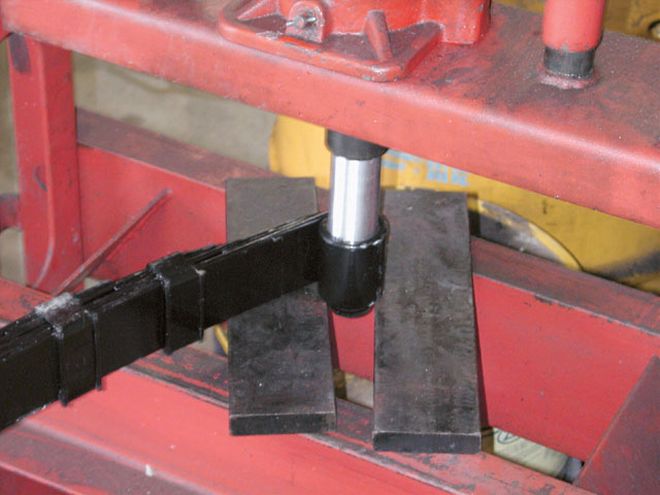
 It's a common thought that traction bars do not belong on Mopars. Countless enthusiasts depend on Super Stock springs and pinion snubbers to control axle wrap-up. While that technology works, Competition Engineering Slide-A-Link bars have been gaining notoriety on Stock race cars for quite some time. For that reason, we decided to give 'em a try.
It's a common thought that traction bars do not belong on Mopars. Countless enthusiasts depend on Super Stock springs and pinion snubbers to control axle wrap-up. While that technology works, Competition Engineering Slide-A-Link bars have been gaining notoriety on Stock race cars for quite some time. For that reason, we decided to give 'em a try.
With the arrival of the UPS truck, the plan had finally come to completion. The Competition Engineering (CE) Slide-A-Link bars I ordered had arrived. We have seen several stock-class racers using the Slide-A-Link bars, and we wanted to know how well they worked. The Slide-A-Link is a completely bolt-on traction device designed for both street and strip use. A solid-mounted front plate is installed inside the original front spring hanger and clamps to the leaf spring. This provides a positive displacement for the torque that is transmitted from the rear axle through the telescoping bar and durometer shock pad. Free travel and pre-load adjustments are made by adjusting the jackscrew at the rear of the bar. Each kit includes lower-axle mount pads, 11/42-inch U-bolts, replacement aluminum, front spring-eye bushings, and all the necessary hardware. These bars offer the adjustability of a four-link suspension, allowing you to tweak them for track conditions.
With the back of the Valiant jacked-up and supported by jackstands under the frame, we began by removing the bottom plates and putting the CE stuff in place. Adding the Slide-A-Link bars was accomplished in a day. Then it was time to see if the adjustability was as good as we had heard.
 First thing, raise the back-end of the car enough to place jackstands under the framerails, and lower the jack to let the rear suspension hang loose.
First thing, raise the back-end of the car enough to place jackstands under the framerails, and lower the jack to let the rear suspension hang loose.
We picked a sunny day to haul the Valiant to Lakeland Motorsports Park. We put the car on the car trailer, just in case something did break. Not only that, but driving on the mickey Thompson slicks would surely get us in trouble. To begin the test, we removed the two bolts holding the bars in place, in order to make our first pass without them.
We arrived at the track early, and the weather was around 75 degrees with no humidity. When it came time to race, I was one of the first cars to hit the starting line. I avoided the water box because I wanted to see what kind of improvement could be had without heating the slicks. After the staged light was lit, I hit the horn button activating the line-lock ("Whoa There, Son", Feb. '03) and brought the rpm up to 4,500 on the tach. When the lights came down, my foot came off the clutch and my thumb off the horn button. Even though it has been several years since I have been to the track, I guess I got lucky-I had a .539 light.
 You will need to remove the rear springs to install the aluminum bushings into the spring eyes. First, support the rear end with a jack and remove the plates under the rear holding it to the springs. remove the springs at their front and rear attaching points. press out the soft bushing and install the aluminum one.
You will need to remove the rear springs to install the aluminum bushings into the spring eyes. First, support the rear end with a jack and remove the plates under the rear holding it to the springs. remove the springs at their front and rear attaching points. press out the soft bushing and install the aluminum one.
The Mickey Thompson E/T Drags bit hard enough at launch to bog the engine and unload the suspension. The 60-foot times were soft with a 2.84. The 60-foot times are a little slow, but, hopefully, installing the Slide-A-Link bars will help. After going back to the pits, I installed the bars and adjusted them until they just touch the stops. Back at the starting line, everything was done the same way-no burnout, and again launching at 4,500 rpm. During the launch, I realized the engine just doesn't have enough oomph to avoid bogging under the traction of the E/T Drags-no big surprise. This time, my reaction time slowed a bit with a .619, but the 60-foot times improved dramatically to a 1.98. By just installing the bars, with no adjusting, we had improved our 60-foot times by a little over eight-tenths of a second. The bars definitely helped. During the launch, I could feel the car push to the left a little. I went back to the pits and tightened the left bar a little less than a quarter-turn to compensate. Back at the starting line, once again no burn out, and we launched at 4,500 rpm. My reaction time was a .605, but our 60-foot times had jumped to a 1.88-another tenth quicker.
At the track, we picked up almost a whole second by simply installing and adjusting these bars. On a high-powered car, the advantages of the Slide-A-Links would definitely be magnified.